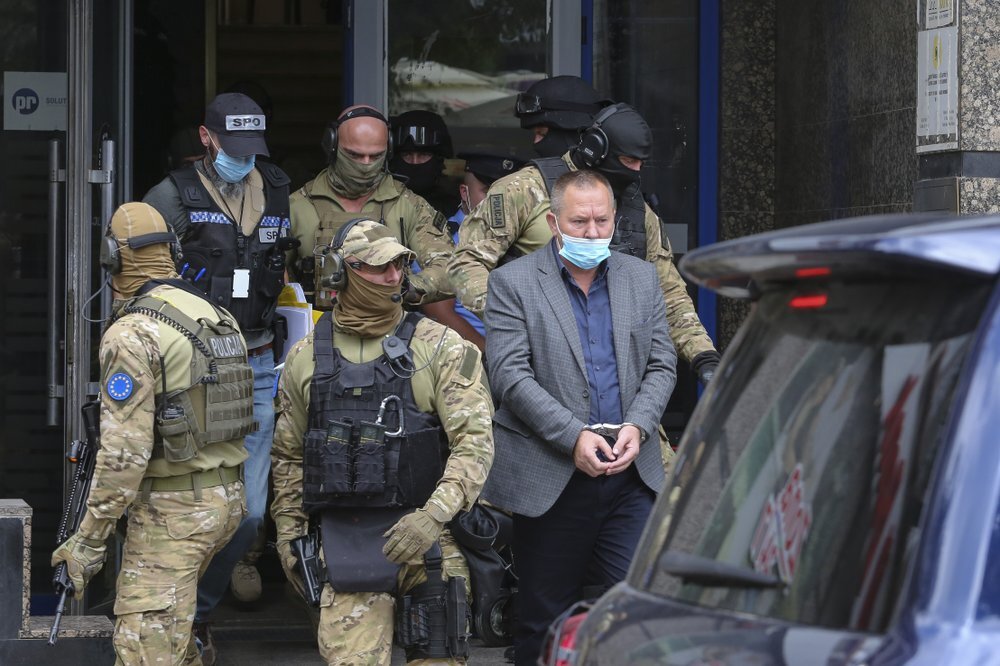Leaked Files Threaten International Court’s Prosecution of War Crimes in Kosovo
Hysni Gucati, the head of the War Veterans Organization of the Kosovo Liberation Army is escorted by European Union security police officers, from the offices of a war veterans association in Kosovo, in Pristina, Friday, Sept. 25, 2020. Source.
The Kosovo Specialist Chambers, an temporary international tribunal located at the Hague, began court hearings last Tuesday concerning a number of Kosovo Liberation Army (KLA) veterans who are accused of war crimes from Kosovo’s war for independence from Serbia in the late 1990s. The goal of the Kosovo Specialist Chambers is to try former KLA fighters, including members of the Kosovo War Veterans’ Organization, for war crimes including murder, torture and illegal detentions taken place during the 1998-1999 war. In the past month, the Kosovo War Veterans’ organization has received three different sets of leaked court documents pertaining to the trials of their members. These mysterious leaks from unknown actors threaten the legitimacy of the Kosovo Specialist Chambers, and its ability to prosecute war crimes.
The head of the Kosovo War Veterans’ Organization, Hysni Gucati, has urged Kosovo media to publish the leaked documents because he believes the documents prove the Kosovo Specialist Chambers to be biased against Kosovo Albanians. Gucati also suggested that the court may be incapable of handling these cases since they have been unable to keep court documentation secure. Since speaking out, Gucati was arrested during a raid on the Kosovo War Veterans’ office.
On the other hand, the Special Prosecutor’s office accused the Kosovo War Veterans’ organization of conjuring controversy about the leaks to undermine the court processes, as they have attempted in the past. Both the Specialist Chambers and the Specialist Prosecutor’s office are based in the Netherlands and operated in common by actors in the international community, for there was a fear that Kosovo’s justice system would have been unable to protect witnesses and handle sensitive trials at home. Many Kosovo Albanians are bitter towards these trials as they feel they are disrespectful to the (partial) victory by the KLA, and that the courts are siding with the Serbians by seeking to prosecute KLA veterans.
Kosovo President Hashim Thaci, a former political leader of the KLA, shared his fear that the Kosovo War Veteran’s push to release leaked documents would negatively affect KLA veterans ability to defend themselves. Thaci himself was indicted in June, but denies all charges against him.
The leaked documents are fundamental to the war crimes cases against KLA veterans, and likely include identifying information about witnesses in the trial. Historically, Kosovo trials have struggled to keep witnesses safe and their information confidential. During the trials for the International Criminal Tribunal for the Former Yugoslavia (ICTY), there were numerous instances of defendants pressuring, threatening or otherwise disincentivizing witnesses from testifying. One witness was even held in contempt of the court for not answering any questions, presumably after being threatened due to his testimony. Many former KLA members hold leadership roles in the current government, so to some citizens there is still an atmosphere of fear that has led to reports of witnesses being killed or pushed to change their testimony through intimidation tactics.
The Kosovo Specialist Chambers were supposed to better handle witnesses' information and protection through the use of pseudonyms, disguised voices, one-way closed circuit video feeds, new criminal charges for witness intimidation, and psychological and medical support before and after the trials. Due to the nature of war crimes, there is rarely evidence, so one of the only things that can be relied on are eyewitness testimonies. Yet, if eye witnesses fear for their safety, as many do in Kosovo already, there is little potential to successfully and legitimately prosecute war crimes.
KLA veterans have the cards stacked against them, as the court seems to expect they will engage in foul play to get out of the trials. While the release of confidential documents is concerning for a court, these documents have not yet been verified to be true. There could be some expectation that this is just another plot by Kosovo War Veterans to escape trials.
Like the Nuremberg Trials, Tokyo War Crimes Trials, and the International Criminal Tribunal for the Former Yugoslavia, the Kosovo Specialist Chambers was created to serve justice in hopes of moving society forward after terrible atrocities. Yet, if Kosovo and former KLA veterans are still reinforcing an environment of fear and manufacturing a narrative of their innocence, there is little hope for the creation of a united Kosovo equipped to face the challenges and struggles on their road to globally recognized independence.

